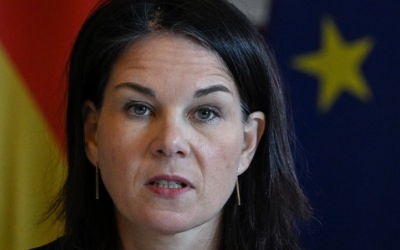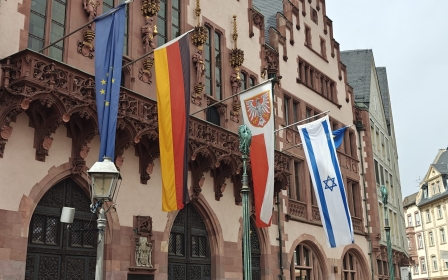New German citizens required to affirm Israel's right to exist

Applicants for German citizenship will be required to explicitly affirm Israel's right to exist under a new citizenship law which came into effect on Tuesday.
The new law shortened the number of years that a person must have lived in Germany in order to obtain a passport, from eight to five years. It will also allow first-generation migrants to be dual citizens.
As part of the shake-up, new questions were added to the country's citizenship test, including about Judaism and Israel's right to exist.
“New test questions have been added on the topics of antisemitism, the right of the state of Israel to exist, and Jewish life in Germany,” the German interior ministry confirmed on Tuesday.
Interior Minister Nancy Faesar said: "Anyone who shares our values and makes an effort can now get a German passport more quickly and no longer has to give up part of their identity by giving up their old nationality.
New MEE newsletter: Jerusalem Dispatch
Sign up to get the latest insights and analysis on Israel-Palestine, alongside Turkey Unpacked and other MEE newsletters
"But we have also made it just as clear: anyone who does not share our values cannot get a German passport. We have drawn a crystal-clear red line here and made the law much stricter than before."
Parts of the test include questions on Germany's historic responsibility towards Jewish people as a result of the crimes of Nazi Germany, and on when the state of Israel was founded.
The new law comes in just days after a report by Das Erste found that the German education ministry had drawn up lists of professors who don't toe the government line on Gaza, in a bid to deprive them of future funding in academia.
Last week, Sabine Doring, a junior minister responsible for higher education, was forced to resign after she had explored the option of cutting funding to signatories of an open letter in support of pro-Palestine student encampments.
Das Erste obtained emails which suggested that the ministry had checked whether it could strip funding from the signatories.
Doring had earlier claimed that the ministry made internal checks about whether the academics had broken any laws, but did not consider removing funds.
Germany is one of Israel's biggest weapons suppliers, selling equipment and weapons last year worth €326.5m ($353.7m), according to data from the country's economy ministry.
Since Israel's war on Gaza began in October, Berlin has enacted a series of repressive measures against acts of solidarity with Palestine.
In March, a state-owned bank in Germany froze the bank account of a Jewish anti-Zionist organisation.
Speeches by Palestinian academics and writers have been cancelled, protests banned and strict policies regarding speech at protests and events have been implemented.
Two months ago, British-Palestinian surgeon Ghassan Abu Sittah was refused entry into Germany to take part in a pro-Palestine conference. The event he was due to speak at, the Palestine Congress, was shut down by hundreds of plainclothes officers, who stormed the event and carried out several arrests.
Middle East Eye delivers independent and unrivalled coverage and analysis of the Middle East, North Africa and beyond. To learn more about republishing this content and the associated fees, please fill out this form. More about MEE can be found here.





